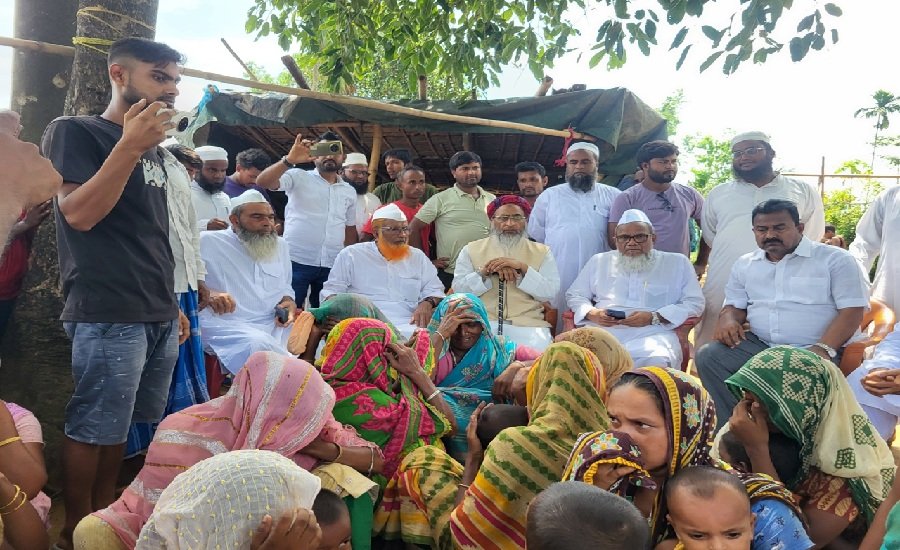A high-level Jamiat Ulama-i-Hind (JUH) delegation visits the violence-hit districts of Dhubri and Goalpara
NEW DELHI – A high-level Jamiat Ulama-i-Hind (JUH) delegation has urged the Central Government to urgently intervene in what it terms a “humanitarian and constitutional crisis” unfolding in Assam.
The appeal comes after the organisation’s fact-finding visit to the violence-hit districts of Dhubri and Goalpara, where an ongoing eviction and demolition drive has displaced thousands of Muslim families.
The delegation submitted a detailed report to JUH President Maulana Mahmood Madani, describing the situation on the ground as “critical, inhumane, and reminiscent of a colonial-era siege.”
The most shocking finding in the JUH report is the police shooting of unarmed civilians on July 17 in Ashudubi village, located in the Paikan forest area of Goalpara district. A 17-year-old boy, reportedly a refugee of the July 12 eviction drive, was killed when police opened fire on a group of displaced people protesting for basic necessities like food, water, and access roads. Three others were seriously injured.

Jamiat delegation meets forcibly evicted families in Assam
“These were starving, exhausted people seeking help. The police response was lethal and totally unjustified,” a JUH official told reporters here on Thursday.
According to the JUH report, over 20,000 people, including 5,700 registered voters, have been evicted from villages such as Charakatra, Santoshpur, and Charwabakra in Dhubri district. Most are now living on sandbanks along the Brahmaputra River, without shelter, clean water, or sanitation.
The delegation accused the Assam government of imposing a de facto siege on these areas. Even handpumps and toilets have been destroyed and relief routes blocked, the delegation found out.
It also alleged that access to the affected areas was restricted to the NGOs.
The Jamiat team’s attempts to deliver food and tarpaulins were reportedly obstructed by local authorities.
The Jamiat said that the evictions are being carried out under the pretext of land clearance for a solar energy project backed by corporate interests.
“This is not about environment or development. It’s about displacing poor Muslims and grabbing land,” said the JUH report.
The delegation also slammed sections of the media for portraying the displaced as “illegal Bangladeshi immigrants,” calling it a “dangerous and false narrative” that risks inciting further violence.
“These are Indian citizens with voter IDs and land documents. Branding them as foreigners is part of a broader campaign to dehumanise and disenfranchise Assam’s Muslims,” the report warned.

The JUH outlined a list of urgent demands to the Union Government. It includes:
• Immediate humanitarian relief: food, water, medical aid, and shelter for displaced families.
• Restoration of access roads for aid organisations and journalists.
• Judicial action against police officials involved in the July 17 firing.
• Compensation for the families of the deceased and injured.
• Resettlement of displaced persons on suitable alternative land.
• Halt to further evictions and withdrawal of “Bangladeshi” labelling, and
• A comprehensive judicial inquiry into the eviction operations and police excess.
Maulana Hakimuddin Qasmi, JUH General Secretary, led the delegation.
The Jamiat team vowed to escalate the issue to national platforms and the judiciary, and to mobilise civil society across the country to resist what they described as a targeted campaign against Assam’s Muslim population.
“This is not just a local tragedy — it’s a national emergency,” said a JUH representative. “We will not rest until justice is served.”

